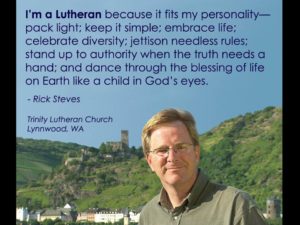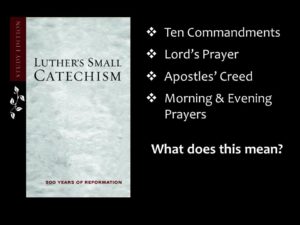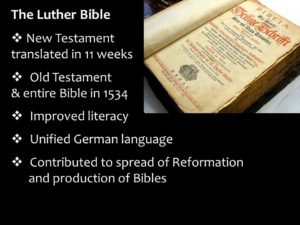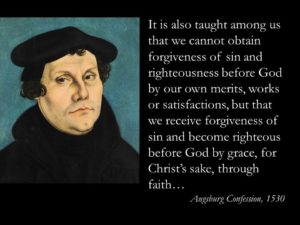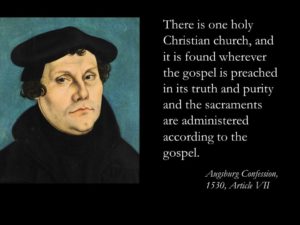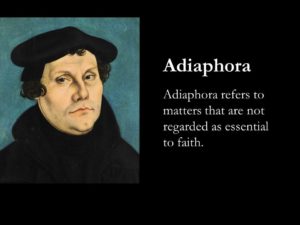What kind of church did Martin Luther envision? What would his hopes be for us today? Perhaps he would pray that we would trust in the Mighty Fortress that is our God, but also lean into the freedom that Christ brings in the Cross. A freedom that opens us up to God using us to change the world.

I didn’t really pay too much attention to Rick Steves until a few years ago when we traveled to Europe as a family. I had his European Travel App on my phone and it was loaded with tons of pod-casts on different cities with narrated walking tours and all sorts of interesting information, both the standard stuff and some of the quirky, inside baseball stuff too.
Now, I had known he was a Lutheran, but I didn’t realize how strongly he identified as Lutheran until his recent special on Luther and some of the quotes I have seen attributed to him about his faith – like this one:
I’m a Lutheran because it fits my personality—pack light; keep it simple; embrace life; celebrate diversity; jettison needless rules; stand up to authority when the truth needs a hand; and dance through the blessing of life on Earth like a child in God’s eyes. (Rick Steves)
As we arrive this week at 500 years of Reformation – I feel like these sentiments largely echo the expression of church that Luther envisioned. But sometimes, I do feel like we lose sight of how unique and truly progressive these ideas are.
Case in point – I’ve had a couple of Roman Catholic friends over the years tease me for being Lutheran, or as they like to call it – Catholic-Lite. That’s ok – I can take it. But what we see with Luther isn’t some easier version of Catholicism or some kind of “Lite” version of Christianity.
Luther wanted to keep it simple, but it wasn’t about dumbing it down – it was about accessibility – he wanted parents to be able to teach their children about the faith and so we wrote the Small Catechism with the basics of the faith – the Ten Commandments, the Lord’s Prayer, the Apostles’ Creed – morning and evening prayers – all with answers to the simple question: “What does this mean?”
Accessibility – Luther wanted people to be able to read and hear the Bible in a language they could understand and so he translated it into German. He wanted to get back to the basics – cut through rules and traditions that didn’t line up with the teachings of Jesus found in Scripture.
Even as Luther and the other Reformers developed their theology – it wasn’t in the so-called ivory tower – it was formed out of life – life that was at times dangerous for those who had radical, new ideas – who were standing up to authority.
They were living life – The Luther home was always full of visitors. There was conversation. There was food. There was music. There was beer. I imagine an energy of ideas and God’s Spirit moving in the midst of so much of the work that was done and the life that was being lived by those Reformers.
We know that at the core of the theology that came out of that work is this foundational statement about faith, Luther writes:
It is also taught among us that we cannot obtain forgiveness of sin and righteousness before God by our own merits, works or satisfactions, but that we receive forgiveness of sin and become righteous before God by grace, for Christ’s sake, through faith… [when we believe that Christ suffered for us and that for his sake our sin is forgiven, and righteousness and eternal life are given to us]. (Augsburg Confession, 1530)
This may seem ho-hum to us today, but this was a statement of faith! God’s gift of grace, not earned, but freely given. Add to this the concept of the “Priesthood of all Believers” – with each of us gifted, in our own way, for doing God’s work in the world – and the world is going to change and it did and it continues.
The Reformation continues. The Church continues to change and evolve – to innovate and respond to the fast-moving culture around us. We can use worship as an example. On my Sabbatical this summer, we worshiped at a bunch of different congregations, city-suburban, small and large. We experienced a variety of instruments and liturgies and leadership styles and configurations and even different ways of serving communion. It was so interesting.
Some things I liked – others I wondered about how they got there in their practice – and even a couple of things I made a note to self not to try. The point is that I learned quite a bit about the diversity that is out there, even among ELCA Lutheran congregations. All of this reminded me of what Luther thought about worship.
Again, in the Augsburg Confession:
There is one holy Christian church, and it is found wherever the gospel is preached in its truth and purity and the sacraments are administered according to the gospel. (Augsburg Confession, Article VII)
For Luther there were two necessities for worship – the gospel preached and the sacrament shared. Everything else was adiaphora.
“Adiaphora” is one of those awesome churchy words – the confirmation students learned about it recently. It refers to matters that are not regarded as essential to faith. It doesn’t mean that they have no value or are wrong to think about, but they are things that are not foundational or that there isn’t necessarily a wrong way or a right way to use them.
For example, Luther loved music. He wrote hymns using tunes that people would know and sing. As a result, music became so important to the Protestant movement through the centuries. Even with the importance of music to Luther, it was still “adiaphora”. Again, the gospel preached and sacraments shared are the only essentials.
So when we hear the organ crescendo with “A Mighty Fortress” and sing parts of the liturgy today. We might think – ah yes – that is Lutheran. And you’d be right. And when the church down on the north side gathers this morning with all the smells and bells and lots of bowing and kneeling – they are very Lutheran too.
Or when worship happens in the coffee house or the bar or the living room or the cathedral or the side of the road in Iraq or Afghanistan or in the country church in the middle of corn fields – as long as the gospel is preached and the sacraments shared – that is worship and God is glorified.
Yes, the Reformation continues. We who continue in this legacy have a challenge ahead of us. The days of the church being the go-to on Sunday mornings is long gone. The day of the church as the hub of town life has largely evaporated. This truly is a new day for the Church. How will we innovate and respond to the change around us? Who will we invite into a relationship with God? What efforts to renew the church can we support and bless with our resources? These are real questions for us today. And they will continue to be with us for many days to come.
And there is good news that comes with these questions too. Good news because we are blessed. Blessed with resources and creative minds and gifts and talents that are so evident, and even some talents that are still hidden within us. And on top of that we have been claimed by God and freed up for life. Jesus makes that point clear:
Jesus said to the Jews who had believed in him, “If you continue in my word, you are truly my disciples; 32and you will know the truth, and the truth will make you free.” 33They answered him, “We are descendants of Abraham and have never been slaves to anyone. What do you mean by saying, ‘You will be made free’?”
34Jesus answered them, “Very truly, I tell you, everyone who commits sin is a slave to sin. 35The slave does not have a permanent place in the household; the son has a place there forever. 36So if the Son makes you free, you will be free indeed.” (John 8:31-36)
We might answer Jesus the very same way – “We are Americans and have never been slaves to anyone”. What do you mean by saying, ‘You will be made free’?
Like those that Jesus was speaking to, we too are wrapped up in our own lives, slaves to bad habits, struggling with our action or inaction.
The good news is that because of Jesus, we are free. We are freed up to be the people God has created us to be. To be those who work to end suffering in the world, to feed the hungry and shelter the homeless, to care for the lonely, to pray for the sick.
We have been given this freedom and new life to be the church for the next generations – to trust in the Mighty Fortress that is our God, but also to pack light, to keep it simple, to embrace life, celebrate diversity and to share the blessings of life in our work and in our play – and in so doing, being open to God using us to change the world.
Amen.
Rev. John Berg
Gloria Dei Lutheran Church, Northbrook, IL

